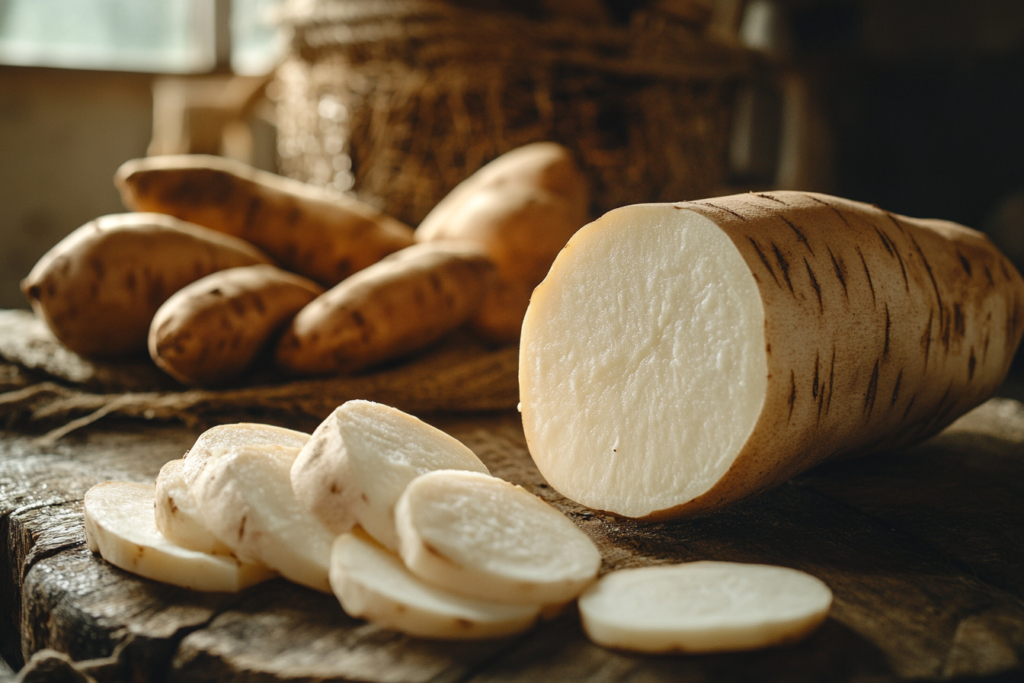When we think of sweet potatoes, the vibrant orange ones often come to mind. But have you ever stopped to wonder about their pale cousins—the white sweet potatoes? These lesser-known tubers often live in the shadow of their orange relatives, yet they hold their own when it comes to flavor and nutrition. So, let’s dig into this often-overlooked variety and answer a pressing question: are white sweet potatoes still healthy?
The short answer is yes! White sweet potatoes are an excellent addition to your diet. They pack a punch of essential nutrients while offering a milder, creamier taste. Unlike regular potatoes, white sweet potatoes have a unique nutritional profile that makes them stand out. But let’s not just scratch the surface—let’s peel back the layers (pun intended) and dive deeper.
Introduction to White Sweet Potatoes
White sweet potatoes aren’t just the “pale cousins” of orange sweet potatoes—they have their own history, flavor, and appeal. Are white sweet potatoes still healthy? Absolutely, and their journey starts centuries ago in Central and South America, where they’ve been a staple food for generations. Today, they’re gaining popularity worldwide, thanks to their versatility and slightly nutty taste.

Nutritional Overview
White sweet potatoes are a fantastic source of complex carbohydrates, making them a great energy booster. Unlike simple carbs, which can lead to a sugar spike, the carbs in white sweet potatoes release energy slowly. Plus, they come with fiber, which keeps your digestion on track.
Popularity Compared to Orange Sweet Potatoes
While orange sweet potatoes steal the spotlight for their beta-carotene (a precursor to Vitamin A), white sweet potatoes are no nutritional slouches. They may not be as vibrant in color, but they offer other nutrients that make them just as valuable in your diet.
Nutritional Composition
White sweet potatoes are nutrient powerhouses, but what exactly do they contain? Let’s break it down.
Macronutrients
- Carbohydrates: Perfect for sustained energy without the sugar crash.
- Proteins: Although not as high as legumes, they still provide a small protein boost.
- Fats: Virtually fat-free, making them heart-healthy.
Micronutrients
What really sets white sweet potatoes apart is their micronutrient content. They’re packed with vitamins and minerals essential for overall health.
Vitamins in White Sweet Potatoes
- Vitamin A: Though not as high as orange sweet potatoes, they still provide a decent amount.
- Vitamin C: Great for boosting your immune system and keeping your skin glowing.
- Other Essentials: Vitamins B6 and E play roles in brain function and skin health.
Nutrition Facts Table
| Nutrient | Quantity (per 100g) |
|---|---|
| Calories | 86 |
| Carbohydrates | 20 g |
| Protein | 1.6 g |
| Fat | 0.1 g |
| Fiber | 3 g |
| Vitamin C | 20% of the daily value |
| Potassium | 15% of the daily value |
Minerals in White Sweet Potatoes
- Potassium: Helps regulate blood pressure and supports muscle function.
- Magnesium: Vital for bone health and reducing the risk of heart disease.
- Calcium and Iron: Key for strong bones and improved energy levels.
Health Benefits of White Sweet Potatoes
It’s no surprise that these creamy tubers come with a host of health benefits. Let’s break them down.
Digestive Health
Thanks to their high fiber content, white sweet potatoes are a boon for your gut. They help maintain regular bowel movements and prevent constipation.
Immune System Support
With their Vitamin C and antioxidants, white sweet potatoes can help fend off those pesky colds and flu.
Eye Health
Although not as rich in beta-carotene as their orange counterparts, they still contribute to eye health with their Vitamin A content.
White Sweet Potatoes and Weight Management
Thinking of shedding a few pounds? White sweet potatoes might just become your new best friend.
- Low-Calorie Benefits: With only about 86 calories per 100 grams, they’re a guilt-free addition to your plate.
- High Satiety Factor: The combination of fiber and complex carbs keeps you full for longer.
- Glycemic Index Impact: They have a moderate glycemic index, meaning they won’t spike your blood sugar levels.
Comparison with Orange Sweet Potatoes
Now comes the showdown: white versus orange sweet potatoes. Which one should you pick?
Nutritional Differences
Orange sweet potatoes are the Vitamin A champions, but white sweet potatoes shine in other areas, such as their higher potassium content.
Taste and Texture
If you prefer a creamier and less sweet taste, white sweet potatoes are the way to go. They’re perfect for savory dishes.
Cooking Versatility
Both types are incredibly versatile. You can bake, boil, roast, or mash them—whatever suits your fancy!
Are White Sweet Potatoes still healthy for Specific Diets?
White sweet potatoes are incredibly versatile and fit well into a variety of diets. Whether you’re following a keto, vegan, or gluten-free lifestyle, they have something to offer.
Keto and Low-Carb Diets
If you’re on a keto diet, you might think sweet potatoes are off-limits due to their carb content. While they are higher in carbs compared to some other keto staples, they can still be incorporated in moderation. A small portion of white sweet potatoes can provide the carbs you need for an active day without tipping your carb limit.
Vegan and Vegetarian Diets
White sweet potatoes are a dream for vegans and vegetarians. They’re an excellent source of plant-based nutrients, including fiber, potassium, and Vitamin C. Plus, their mild flavor pairs beautifully with plant-based proteins like lentils and chickpeas.
Gluten-Free Considerations
For those avoiding gluten, white sweet potatoes are a safe and delicious alternative to grains. You can use them as a base for gluten-free gnocchi, pancakes, or even baked fries.
Potential Risks and Concerns
As wonderful as white sweet potatoes are, no food is without its potential downsides. Here are a few things to keep in mind.
Overconsumption Effects
Eating too much of anything—even something as healthy as white sweet potatoes—can lead to problems. Overindulging may cause weight gain or digestive discomfort due to their fiber content.
Allergies and Sensitivities
Though rare, some individuals may have allergies or sensitivities to sweet potatoes. Symptoms can include itching, swelling, or digestive issues. If you’re trying them for the first time, start with a small portion to gauge your tolerance.
Pesticide and Farming Concerns
Conventionally grown sweet potatoes may carry pesticide residues. To minimize risks, opt for organic varieties whenever possible or wash them thoroughly before cooking.
Cooking Methods and Nutritional Impact
How you prepare white sweet potatoes can significantly affect their nutritional value. Let’s explore some popular cooking methods and how they measure up.

Boiling vs. Baking
Boiling white sweet potatoes is one of the healthiest ways to prepare them, as it preserves most of their nutrients while keeping their calorie content low. Baking, on the other hand, can enhance their natural sweetness and add a slightly caramelized flavor.
Steaming vs. Frying
Steaming is another excellent option for retaining nutrients, especially water-soluble vitamins like Vitamin C. Frying, while delicious, adds extra calories and fat, making it less ideal for those watching their weight.
Preserving Nutrients During Preparation
To get the most out of your white sweet potatoes, leave the skin on whenever possible—it’s packed with fiber and antioxidants. Also, avoid overcooking, as this can deplete their vitamin content.
How to Incorporate White Sweet Potatoes into Your Diet
Adding white sweet potatoes to your meals is easy and fun. Their mild flavor and creamy texture make them a versatile ingredient for a variety of dishes.

Meal Ideas
- Breakfast: Try white sweet potato hash with eggs and spinach for a nutrient-packed start to your day.
- Lunch: Make a hearty sweet potato soup or toss them into a salad with some roasted chickpeas.
- Dinner: Use them as a base for mashed sweet potatoes or roast them alongside your favorite proteins.
Snacks and Desserts
White sweet potatoes can also shine in snacks and desserts. Bake sweet potato fries for a healthy snack or use mashed sweet potatoes in gluten-free brownies for a guilt-free treat.
Recipes for Beginners
For those new to cooking with white sweet potatoes, start simple. Try boiling them and sprinkling some salt, pepper, and olive oil for a quick and delicious side dish.
White Sweet Potatoes in Different Cultures
White sweet potatoes are a staple in various cuisines around the world, each culture putting its unique spin on this humble tuber.
Traditional Recipes Worldwide
- In the Caribbean, white sweet potatoes are often boiled and served with salted fish.
- In Japan, they’re used in tempura dishes or steamed as a standalone snack.
- In the Philippines, they’re mashed and mixed with coconut milk for a creamy dessert called “ginataan.”
Unique Uses in Global Cuisines
White sweet potatoes are also gaining popularity in fusion cuisine. Chefs worldwide are incorporating them into tacos, curries, and even sushi rolls for a creative twist.
Buying and Storing Tips
Knowing how to pick and store white sweet potatoes is key to getting the most out of them.
How to Pick Fresh White Sweet Potatoes
Look for firm, smooth sweet potatoes without cracks, soft spots, or discoloration. Smaller ones tend to be sweeter and less starchy.
Proper Storage Methods
Store them in a cool, dark place like a pantry. Avoid exposing them to sunlight, as this can cause sprouting.
Shelf Life
White sweet potatoes can last for several weeks when stored properly. If they start to sprout or become soft, it’s time to use them up or toss them.
Related Recipe Articles you might like
White sweet potatoes are an excellent addition to your diet, and if you’re looking for creative ways to include them in your meals, explore our 10 easy and delicious white sweet potato recipes. For a deeper dive into their health benefits and cooking tips, check out Discover White Sweet Potatoes: Health Benefits and Easy Cooking Tips. And for a comforting, creamy side dish that offers a rich twist on classic comfort food, try our Loaded Mashed Potatoes Recipe, which pairs perfectly with any meal
Still deciding which sweet potato color suits your needs? Our guide on Which Color Sweet Potato Is Healthiest? A Comprehensive Guide can help you make an informed choice.
Conclusion: Are white sweet potatoes still healthy
White sweet potatoes are a delicious, versatile, and nutritious food that deserves a spot on your plate. Are white sweet potatoes still healthy? Absolutely! Whether you’re looking to boost your health, try new recipes, or simply enjoy a tasty meal, these creamy tubers have got you covered. So why not pick up a few on your next grocery run and start experimenting in the kitchen? Your taste buds—and your body—will thank you.
Frequently Asked Questions (FAQs)
How healthy are white sweet potatoes?
White sweet potatoes are a nutritious choice, rich in energy-providing carbohydrates, dietary fiber for digestion, and essential vitamins like Vitamin C and B6. They support immunity, brain function, and overall health. While lower in beta-carotene than orange varieties, they offer a mild flavor and are versatile for various dishes, making them a valuable addition to a balanced diet.
Which color sweet potato is healthiest?
The healthiest sweet potato depends on your nutritional needs. Orange sweet potatoes are high in beta-carotene for eye and immune health, while purple ones contain anthocyanins, powerful antioxidants for brain and heart health. White sweet potatoes are rich in Vitamin C and potassium, offering unique benefits and versatility in cooking.
What happens if a sweet potato is white?
A white sweet potato is simply a natural variety with white flesh. It is safe to eat and shares many health benefits with other sweet potato types. Known for its creamy texture and mild flavor, it works well in savory dishes like mashed potatoes, soups, and casseroles.
Are white sweet potatoes nightshades?
No, white sweet potatoes are not nightshades. They belong to the Convolvulaceae family, unlike nightshades such as tomatoes and eggplants from the Solanaceae family. White sweet potatoes lack the alkaloids found in nightshades, making them suitable for individuals avoiding these vegetables.

